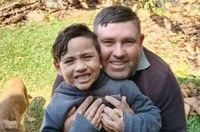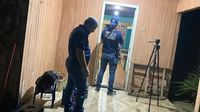In a shocking case that has gripped Brazil, Tiago Ricardo Felber, 40, has been arrested for the tragic murder of his five-year-old son, Théo Ricardo Ferreira Felber. The incident occurred on March 25, 2025, when Tiago threw his son off a bridge into the Vacacaí River in São Gabriel, a small town in Rio Grande do Sul. This heinous act, which Tiago later described as a "loucurinha" (little craziness), has raised serious questions about his mental state and the circumstances surrounding the crime.
According to reports, Tiago confessed to the murder, claiming it was an act of revenge against Théo's mother, Abigail Luisa Ferreira Felber. The couple had been separated since November 2024, and Tiago allegedly struggled to accept the end of their relationship. In a chilling audio message sent to a family member shortly after the incident, he stated, "guria, seja forte. Fiz uma loucurinha agora, tá? Aguenta o coração para o resto da vida. Atirei o Théo lá pra baixo da ponte agora" (girl, be strong. I did a little craziness now, okay? Hold your heart for the rest of your life. I threw Théo down from the bridge now).
The police investigation revealed that Tiago had initially intended to harm Abigail and her new partner. However, on March 23, he changed his mind and decided to kill Théo instead. Just a day prior to the fatal incident, he had attempted to suffocate his son but failed. The following day, he took Théo to celebrate his own birthday before committing the unthinkable act.
Security camera footage captured the moments leading up to the tragedy, showing Tiago cycling with Théo sitting in a crate attached to the front of his bicycle. Witnesses reported seeing them heading towards the bridge shortly before the incident occurred.
After throwing his son from the bridge, Tiago turned himself into the police, confessing to the crime. He was subsequently arrested and has been held at the State Prison of São Gabriel. Following his arrest, Tiago's defense lawyer, Roberto Leite, raised concerns about the legality of his detention, claiming that Tiago had been subjected to police brutality and had given statements without legal representation.
During a custody hearing held on March 26, Tiago's defense argued that his confession should be deemed invalid because he was not informed of his right to have an attorney present during questioning. Leite stated, "It is a constitutional right for anyone being interrogated to have a lawyer with them. Therefore, any statement made without legal representation is invalid." However, police delegate Daniel Severo countered this argument, asserting that Tiago was aware of his rights before speaking to the authorities.
Severo also mentioned that there were no reports or evidence to support claims of police aggression against Tiago during his arrest. The delegate further noted that Tiago had voluntarily confessed to the crime, indicating that he was not coerced into making statements.
In addition to the legal proceedings, Tiago's defense has expressed concerns for his safety while incarcerated, claiming that he has been threatened by other inmates. As a result, they have requested his transfer to a different prison facility, such as those in Santa Maria or Charqueadas. The Secretary of Penal and Socio-Educational Systems of Rio Grande do Sul has stated that all allegations of threats are thoroughly investigated.
The tragic death of Théo has left the community of Nova Hartz in mourning. The young boy was buried on March 28, 2025, in the Municipal Cemetery of Nova Hartz, where he had lived with his mother. Abigail described her son as "anxious" to visit his father before the incident, and she expressed disbelief at the violence that unfolded. "He was a good father, I thought, but a good father doesn’t do what he did to my son. He is a monster. There’s no excuse for the level of cruelty. We are devastated. He destroyed my family, he destroyed everything," Abigail lamented.
The case continues to unfold as the investigation by the Civil Police proceeds. Tiago's actions have sparked outrage and sorrow, prompting discussions about mental health, domestic violence, and the legal system's handling of such cases. As the community grapples with this tragedy, many are left wondering how a father could commit such an unspeakable act against his own child.
Tiago Ricardo Felber's story is a grim reminder of the deep-seated issues surrounding familial relationships and the devastating consequences that can arise from unresolved conflicts. The legal proceedings ahead will determine the fate of a man who has irrevocably altered the lives of those around him.









